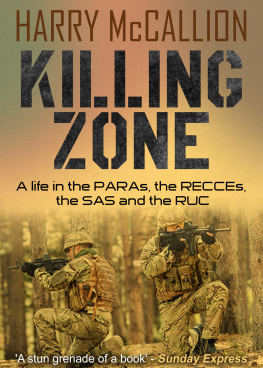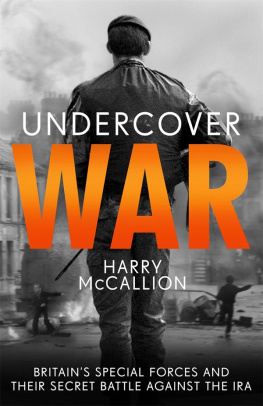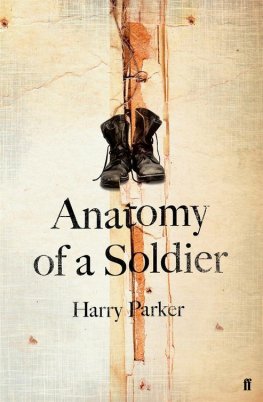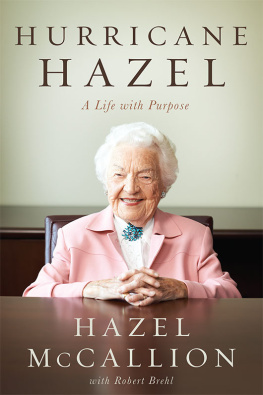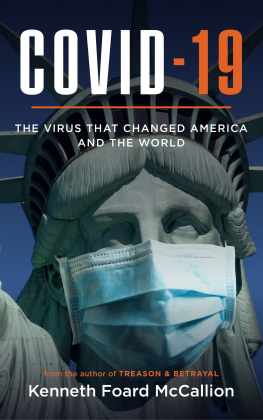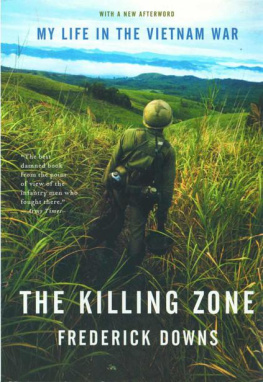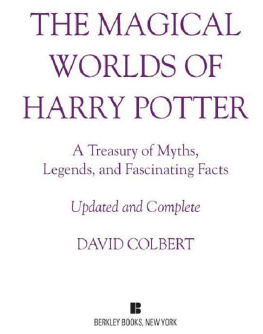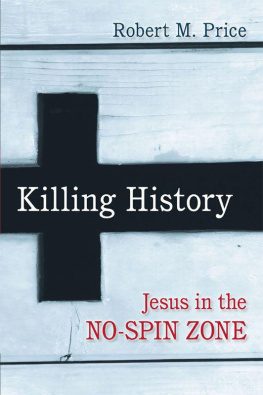Killing Zone
Harry McCallion
Copyright Harry McCallion 1995
The right of Harry McCallion to be identified as the author of this work has been asserted by him in accordance with the Copyright, Designs and Patents Act, 1988.
First published in the United Kingdom in 1995 by Bloomsbury.
This edition published in 2015 by Endeavour Press Ltd.
This book is dedicated to Bob T, B Squadron, 22 SAS
Table of Contents
1 My Early Life
If a woman asks you to marry her, spit on her. The only words of advice my father ever gave me.
To say I was brought up is like saying the Second World War started in 1939 and finished in 1945 and leaving it at that. I was dragged, kicking and screaming, through a time that only barely resembled childhood, into a premature adulthood. This story does not start with my birth.
I have only faint memories of my grandfather Henry, after whom Im named. An elderly man with a white beard, he told me stories of the Great War during which hed served with the Argyll and Sutherland Highlanders and been decorated for bravery. He could have made the Army a career but chose civilian life after the armistice. He was a stern martinet with the strictest of moral views who was respected in the community, and this, combined with his fine war record, prompted many to urge him to stand for local office but he steadfastly refused. First and foremost he was a family man and, like many Catholics, he believed in a large one.
My mother, Mary, was the third eldest of a family of five: two boys and three girls. From almost the time she could walk, she was the bane of her fathers life. Where he was austere and conservative, she was a rebel, a tomboy who preferred to wear jeans and a leather jacket rather than a skirt, and could hold her own in a fist-fight with any boy her own age. Confrontation soon came. Mary started to smoke at a very early age in direct defiance of, and probably because of, her fathers warnings. At the age of twelve she walked into the house and lit a cigarette in front of him.
Grandfather, who would not even let his wife smoke in the house, was being defied by his daughter. His reaction was swift and brutal. He slapped the cigarette from her mouth, stripped her naked, hung her by her arms from a door and thrashed her with his broad working mans belt until she was unconscious. Only the intervention of my grandmother saved her from further punishment. The scene was set for years of confrontation. If Grandfather thought that by whipping my mother he would break her spirit, he was badly mistaken. The physical abuse she suffered simply made her more determined, more obstinate and more of a rebel, characteristics she passed on to all her children, although it would be three years before she again tried to smoke in front of him. My mother told me: At fifteen I thought I was as hard as nails and able to take my father. I swaggered into the sitting room with a lit cigarette in my mouth. My father looked up from his chair.
Whats that youve got in your mouth, he said quietly.
A cigarette. If you dont like it we can go outside and sort it out.
A slight smile played on his face. Are you offering to take me outside?
Thats right, outside.
He sighed. OK. Ill just put my boots on.
Like an idiot, I stood there and watched as he laced up his heavy working boots. She shook her head with the memory, then smiled. He kicked me out of the house, down the stairs, into the yard and back up again. I would never physically challenge my father again.
The realization that she could not overcome him drove my mother to seek another method of rebellion in the shape of my father, Allan. He was a hard man in a city of hard men. He was not tall, but lightning-fast, vicious, relentless and, even, in his early years, willing to resort to any weapon that was at hand. He was also a man with plans to escape the grinding poverty of Glasgow, for the lush pastures of England, which suited my mother admirably. Allan also saw himself as a reincarnation of Al Capone. In his mind he would build a criminal empire in England with his brothers, Henry, Wally and John, who were cut from the same cloth unstable, immoral and extremely violent. Around them they would eventually gather others with similar talents.
My mother became pregnant, then married my father. She was sixteen. Six months later, in early January 1953, I was born. According to my mother, just after my birth I contracted a serious illness. The local doctor was called but told my parents that there was nothing to worry about. My mother was not convinced, and my father decided to take me to hospital, where they diagnosed scarlet fever. The hospital doctor told him that had I not been admitted that night I would almost certainly have died. His reaction was typically simple and brutal: he went to the local doctors surgery the next day and hospitalized him.
We lived in Lime Hill Road in the Gorbals. My earliest memory of my father is from when I was four. A bus route passed directly in front of our tenement block, and one day the door burst open and my mother rushed past me, a giant in the uniform of a bus conductor some way behind her. He was shouting, Send out your man.
Allan walked purposefully down the small garden path outside our front door. He must have been at least a foot smaller and a stone lighter than his challenger, but my father was an expert. He never wasted words. Talking to somebody you were going to do was a waste of energy and simply put them on guard. The conductor was still shouting threats when my father jumped up and head-butted him. Blood exploded over the mans face as he began to fall. My father grabbed hold of his lapels and pulled him on to two more savage head-butts as he slid to the floor.
My father lived by the maxim if you put a man down, make sure he stays down. He began to kick the man rapidly in the face and body. Then he slowed and walked round his crawling victim to deliver well-aimed kicks to the kidneys and groin. The bus conductor tried to scramble out of the garden towards his waiting bus. My father followed him, still kicking, even as the man screamed for mercy and help. He got neither. The driver and passengers watched in silence as he was kicked back on to the bus. Only then did they reboard it. My father rang the bell.
With the bus gone he looked left and right, challenge in his eyes. Our neighbours simply shrugged. The bus conductor had insulted my mother and taken on my father. In their brutal world, it had been a fair fight. My father walked back to where I stood in the corridor, a smile of satisfaction on his face, ruffling my hair as he passed. Mum cleaned up the blood on the pavement.
My father was often absent but I was too young to realize this was due to his frequent periods of incarceration. At first his were crimes of violence, but theft and robbery would soon follow. Although he saw himself as a master criminal, his first attempt at theft was farcical. He had been working in the shipyard and was stealing lead, which he smuggled out down the sides of his boots to avoid snap inspections by security guards at the dock gate. He stole a small amount each day and sold the lot at the end of the week to a scrap merchant. His greed and daring increased. One night he filled his boots with several pounds of lead, but as he walked towards the main gate he found it increasingly difficult to lift his feet. He struggled towards the gate like a deep-sea diver, dragging each foot forward inch by inch. Passing workmen stopped to watch; some even cheered him on. By the time he reached the gate he could no longer lift his legs at all. He stood there panting with exhaustion as the security guard burst into uncontrolled laughter. He was searched and got six months.

